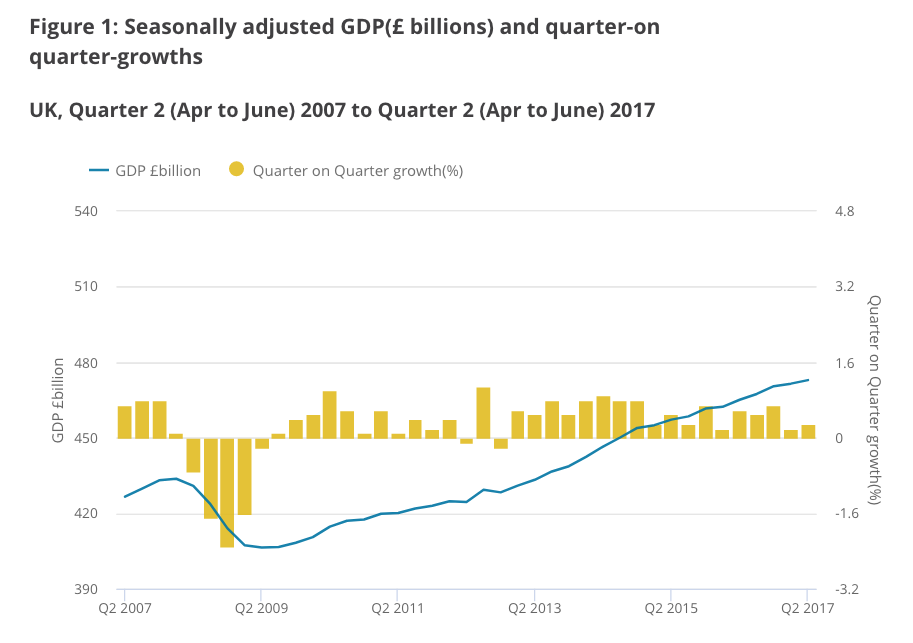The Brexit slowdown continues — Britain's economy grew just 0.3% in the second quarter

Reuters
LONDON — Britain's economy grew as expected in the second quarter of 2017, but continued to experience a Brexit-based struggle, according to preliminary numbers from the ONS released on Wednesday.
GDP grew by 0.3% in the quarter, the ONS said, while annual growth was 1.7%.
Prior to the release economists had forecast 0.3% growth, representing a small increase from the 0.2% growth seen in the first quarter. Yearly growth was forecast at 1.7%.
The 0.3% growth in the second quarter marks the second slowest growth since the beginning of 2016, with only Q1's number worse.
"In Quarter 2 (Apr to June) 2017, UK GDP was estimated to have increased by 0.3%. The services aggregate was the main driver to the growth in GDP, contributing 0.42 percentage points," the ONS said.
"Production and construction recorded falls in Quarter 2 2017 of 0.4% and 0.9% respectively, each contributing negative 0.06 percentage points to GDP. Agriculture recorded moderate growth of 0.6%, contributing nothing to GDP due to the low industry weight."
"The largest contributors to growth in services were retail trade, which improved after a fall in the first quarter, and film production and distribution."
"The economy has experienced a notable slowdown in the first half of this year," ONS Head of GDP Darren Morgan said in a statement released alongside the data.
"While services such as retail and film production & distribution showed some improvement in the second quarter, a weaker performance from construction and manufacturing pulled down overall growth.”
It should be noted that these figures are preliminary, and could be revised higher or lower in the coming months.
Here is the chart showing the quarter as part of the longer term trend:

ONS
Until the beginning of 2017, the UK economy fared better than all but the most optimistic of forecasters imagined in the immediate aftermath of the Brexit referendum, confounding predictions of an immediate recession, and virtually ignoring any uncertainty over the future.
However, as the falling pound has pushed up inflation in recent months, regular Brits have started to feel the pinch, spending less, and slowing the consumer boom that has fuelled the country's economic performance in the past handful of years.
While Wednesday's numbers aren't great, Ben Brettell, a senior economist at investment firm Hargreaves Lansdown believes there is cause for at least a little optimism.
"Today’s GDP figures showed growth remains largely anaemic, accelerating slightly to 0.3% in the second quarter from 0.2% in Q1 ... Yet despite lacklustre growth so far this year, there are tentative signs that things might improve in the second half," he wrote in an emailed statement.
"Last week saw news that retail sales rose ahead of expectations, indicating the consumer may still have some petrol in the tank – though the Bank of England has expressed caution over rising levels of personal debt. Meanwhile inflation began to recede, which if it continues in the coming months could end the squeeze on real incomes."
UK GDP has now grown in 18 consecutive quarters. The last time UK GDP shrunk over a quarter was in Q4 of 2012 when the economy readjustedfollowing a huge boost from the 2012 Olympic Games in London.
NOW WATCH: The 5 biggest stock market crashes in history have 'striking' similarities
See Also:
Here's how each state's economy did in the first 3 months of this year
Consumer spending propels economic growth in the 2nd quarter — but by less than expected
The 7 scariest challenges facing the British economy, according to analysts
SEE ALSO: The 7 scariest challenges facing the British economy, according to analysts
DON'T MISS: There's light at the end of the tunnel for the key driver of the British economy

 Yahoo Finance
Yahoo Finance 
